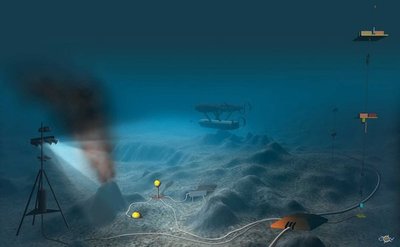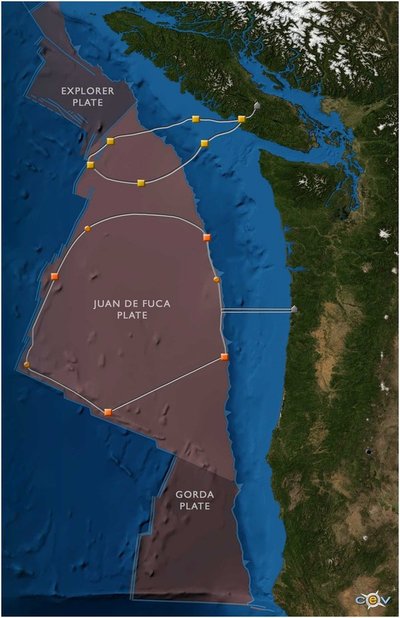May 24, 2007
New hires, planning under way for proposed $130 million ocean observatory
Peter Barletto, who has more than three decades of experience with submarine cable systems and networks, started work at the University of Washington Monday, joining the project team tasked with developing detailed engineering specifications for a cabled underwater research facility to be built off the coast of Washington and Oregon.
The brainchild of University of Washington oceanographer John Delaney, the proposed facility would be the world’s first ocean observatory to span a tectonic plate. It could provide a constant stream of data in real time from throughout the water, on the seafloor and below the seafloor across the Juan de Fuca plate.
The Joint Oceanographic Institutions, a national organization, has awarded the UW $2.2 million of National Science Foundation money to develop engineering specifications, engage interested parties and seek permits. If the funding approvals and permits are obtained, the underwater research facility would be in line to receive $130 million over six years for construction.
The facility could help unlock secrets about the ocean’s ability to absorb greenhouse gases and how seafloor stresses cause earthquakes and tsunamis along Pacific coastlines, says Delaney, who is the long-time leader of the Neptune Project, the UW research and education program focused on studies of the Juan de Fuca plate. Investigations could lead to powerful new medicines derived from microbes and animals that thrive in the extreme environments of the region’s underwater volcanoes. Data collected and transmitted in real time by the network will help improve weather forecasting and management of valuable fish stocks such as salmon.
It has been proposed that the underwater research facility initially have four sites – or nodes – with sensors in the water column, on the seafloor and below the seafloor, all connected by more than 850 miles of cable for power and communications. Data, video, still imagery and instructions will be sent to and from shore nearly instantly, via the Internet.
Barletto comes to the UW from VSNL International – where he was vice president of network and strategic planning for a network of more than 43,000 miles of transoceanic submarine cable. Also joining the undersea observatory project team will be Michael Kelly, who has been senior director of strategic network planning with VSNL.
Delaney is principal investigator, director and chief scientist of the project team that includes the Applied Physics Laboratory’s Gary Harkins, as chief engineer, and their colleagues from the UW School of Oceanography and APL. (See http://www.ooi.washington.edu/rsn/secondary.jsp )
Last week the Seattle Times wrote that Tony Haymet, director of the Scripps Institution of Oceanography, said that the underwater research facility will overnight make the Northwest a leader in the field of ocean study.
“Done properly, five years from now it will revolutionize oceanography,” the Times quotes Haymet. “It’s going to start in the Northwest, and people in the Northwest should be justifiably proud of that.”
Learn more about the UW’s project at http://www.ooi.washington.edu/.
The underwater research facility is one of four projects in a $331 million, six-year effort to better understand the world’s oceans that’s called the Ocean Observatories Initiative. The cabled regional observatory, ocean observing systems in coastal waters and around the globe, and the cyberinfrastructure for all the observatories are under the umbrella of the Joint Oceanographic Institutions out of Washington, D.C. The Joint Oceanographic Institutions press release is at http://www.joiscience.org/Newsroom/Press_Releases/ooi_awards_5_07.html.
“This new ocean observatory capability will provide novel and enduring ways to study the oceans. These new approaches are going to revolutionize not only how we humans look at oceans and the earth, but eventually – in the time of our children’s children – the way we manage our entire planet,” Delaney says.
Tag(s): John Delaney • Ocean Observatories Initiative • oceanography • School of Oceanography

